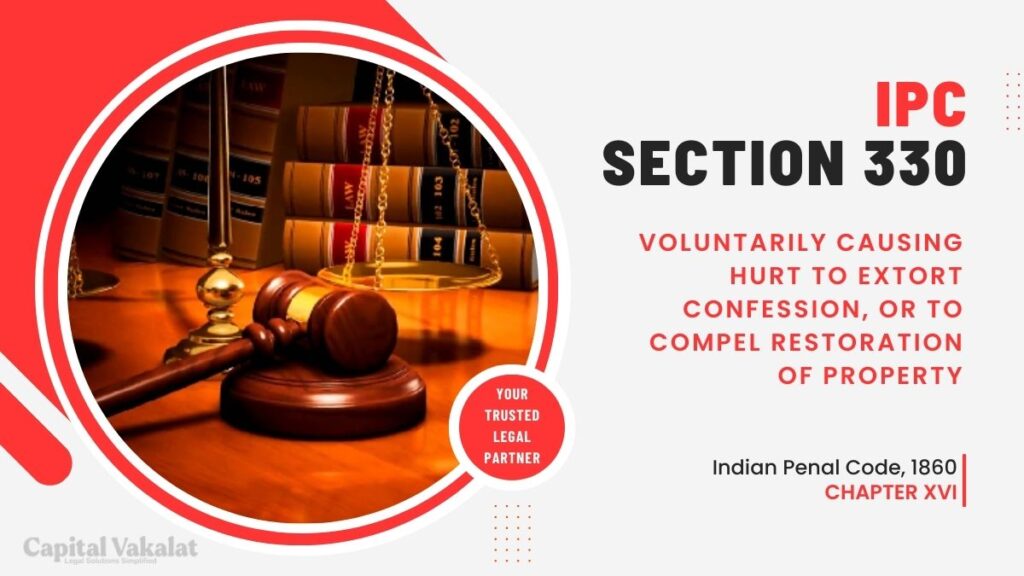In the intricate fabric of the Indian Penal Code (IPC), Section 330 stands as a distinctive legal provision with significant implications. This article delves into the depths of Section 330 IPC, focusing on the voluntary causing of hurt to extort a confession or compel the restoration of property.

Understanding this section is not only crucial for legal practitioners but also for the general public, as it touches upon the delicate balance between justice and the protection of individual rights.
Understanding Section 330 IPC
At its core, Section 330 IPC addresses the intentional infliction of harm with the aim of extracting a confession or compelling the restitution of property. To comprehend the nuances of this provision, it is essential to differentiate between causing hurt for the purpose of obtaining a confession and doing so to enforce the return of property. The section carefully delineates the circumstances under which such actions are deemed criminal, establishing a legal framework that seeks to curb potential abuse.
Historical Context
The roots of Section 330 IPC trace back through the annals of legal history. Examining the evolution of this provision sheds light on the legislative intent and the societal conditions that necessitated its inclusion. Landmark cases have played a pivotal role in shaping the interpretation of Section 330, contributing to the jurisprudential landscape of India.
Legal Consequences
A critical aspect of Section 330 IPC is the array of penalties associated with its violation. From fines to imprisonment, the legal consequences are designed to act as a deterrent. Real-world case studies serve as poignant examples, illustrating the tangible impact of legal enforcement and the severity of repercussions for those found guilty under this section.
Controversies and Debates
As with any legal provision, Section 330 IPC has not been immune to criticism and debate. Concerns regarding its application, potential for misuse, and impact on individual rights have sparked discussions within the legal community and the broader public sphere. Exploring these controversies provides a holistic view of the challenges associated with enforcing and interpreting this section.
Landmark Cases
To truly grasp the implications of Section 330 IPC, it is imperative to analyze landmark cases that have shaped its interpretation. Through detailed examinations of legal precedents, we can glean insights into the complexities of applying this section in various contexts, ultimately influencing the trajectory of future cases.
Prosecution Challenges
Enforcing Section 330 poses unique challenges for prosecutors. Proving intent and causation in cases involving the voluntary causing of hurt requires a meticulous examination of evidence. This section explores the difficulties faced by prosecutors and the common defense strategies employed to counter allegations under Section 330 IPC.
International Perspectives
A comparative analysis of similar laws in other jurisdictions offers a broader perspective on the legal landscape surrounding the voluntary causing of harm for specific purposes. Drawing lessons from international practices can inform discussions on potential improvements or reforms to Section 330 IPC, ensuring alignment with global human rights standards.
Reform Proposals
In the spirit of legal evolution, this section of the article delves into proposals for reforming or amending Section 330 IPC. Balancing the imperative of justice with the need to safeguard individual rights is a delicate task, and exploring potential reforms contributes to ongoing discussions within the legal community.
Conclusion
In conclusion, Section 330 IPC stands as a testament to the complexities inherent in the pursuit of justice. This article has journeyed through the intricacies of this legal provision, offering insights into its historical evolution, legal consequences, controversies, and international perspectives. The need for a nuanced understanding of Section 330 IPC is evident, ensuring that legal practitioners and the public alike appreciate the delicate balance it seeks to strike.
Frequently Asked Questions
How do defense strategies differ in cases involving hurt for confession versus property restoration?
Defense strategies often hinge on challenging the intent behind the actions. Proving coercion for confession or property restoration can lead to distinct legal arguments.
Are there any recent amendments to Section 330 IPC?
As of my last knowledge update in January 2022, there were no recent amendments. It’s advisable to check the latest legal updates for the most current information.
Does Section 330 IPC apply to law enforcement officials?
Section 330 IPC applies universally, and law enforcement officials are not exempt. However, the specific circumstances and legal considerations may vary.
How does India’s legal framework compare to international standards regarding the voluntary causing of harm?
International perspectives suggest a diverse range of legal approaches. India’s legal framework, including Section 330 IPC, should be understood in its unique cultural and historical context.